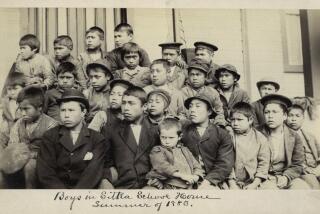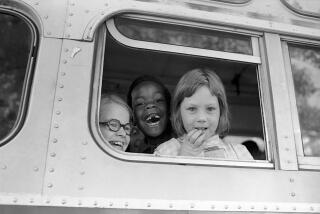IDEAS : Rich Tactic for the Poor: Put Youths in Boarding Schools
For generations, rich families have turned to boarding schools to straighten out their errant offspring.
Could that upper-crust model be a solution to the problems of crime, disorder and poverty afflicting the inner-city poor?
That is the provocative contention of James Q. Wilson, a professor at the UCLA Graduate School of Management and a prolific author on crime, social policy and urban problems for the last three decades.
At a time when activists on all sides of the political spectrum are debating how best to help the isolated urban underclass, Wilson--a leading figure in the “neoconservative” network of rightward-leaning social critics--has placed on the agenda a new proposal incendiary in its simplicity.
In a recent speech to the American Enterprise Institute, a Washington think tank, Wilson maintained that, in urban neighborhoods where single-parent families are the rule, the best way to prevent children--boys in particular--from replicating the pattern of drugs, violence and illegitimacy may be to remove them from their homes.
“When parents cannot or will not socialize their children, they have in the past turned that task over to boarding schools,” Wilson said. “Boarding schools are not for everyone, but they are better for some people.”
Toward that end, Wilson proposed that the government provide financial assistance that would “enable families in underclass neighborhoods to enroll their children, beginning at an early age, in boarding schools.” The children might go either to existing boarding schools or new institutions created to meet the need, he said.
In an interview, Wilson said the program would be, “of course, voluntary” but that “mothers might be encouraged by counselors or social workers to avail themselves of these opportunities.”
Is splitting up more families the best way to instill middle-class family values in the urban poor? Charles Murray, a conservative social policy critic, called Wilson’s proposal “one of the most interesting ideas that’s come across. The fact is . . . we just don’t know how to help a lot of kids in the inner city.”
To some other social scientists, Wilson’s idea seems new only because it is so old. During the last half of the 19th Century, “one of the preferred strategies for dealing with urban poverty was breaking up families,” said Michael B. Katz, director of the urban studies program at the University of Pennsylvania and the author of a history of poverty in the United States.
Popular ideas at the time included relocating children from urban tenements to live with families in the country and sending children to orphanages when their families went to live in the harsh, degrading environment of poorhouses.
By the turn of the 20th Century, though, social welfare professionals concluded that it was better to keep families together whenever possible, Katz said. Changing directions now, he argues, would make little sense.
“We know (that) these kinds of attempts to institutionalize children, with a few exceptions, have by and large been disasters,” Katz said. But Wilson in his speech argued that boarding schools could fortify young inner-city children with the “moral, political, religious or ethnocentric” instruction that is eroded in communities where so few families include fathers.
“Neighborhood standards may be set by mothers, but they are enforced by fathers, or at least by adult males,” Wilson said. “Neighborhoods without fathers are neighborhoods without men able and willing to confront errant youth, chase threatening gangs and reproach delinquent fathers.”
No one foresees an imminent movement of this debate from the academic into the political world; when Mayor Tom Bradley fleetingly offered a similar proposal in 1985, little came of it.
For at least the near future, the primary significance of Wilson’s proposal may be to illuminate the eagerness for new ideas to confront the intractable problems wrenching underclass communities--and the skepticism that any single initiative could quickly brighten the picture. “We are choosing between a bunch of rotten alternatives,” said sociologist Christopher Jencks of Northwestern University, an expert on the underclass. “None of us are very enthusiastic about the kind of families these kids are growing up in, and none of us are very enthusiastic about the kind of institutions that would be created to care for them.”
More to Read
Sign up for Essential California
The most important California stories and recommendations in your inbox every morning.
You may occasionally receive promotional content from the Los Angeles Times.










